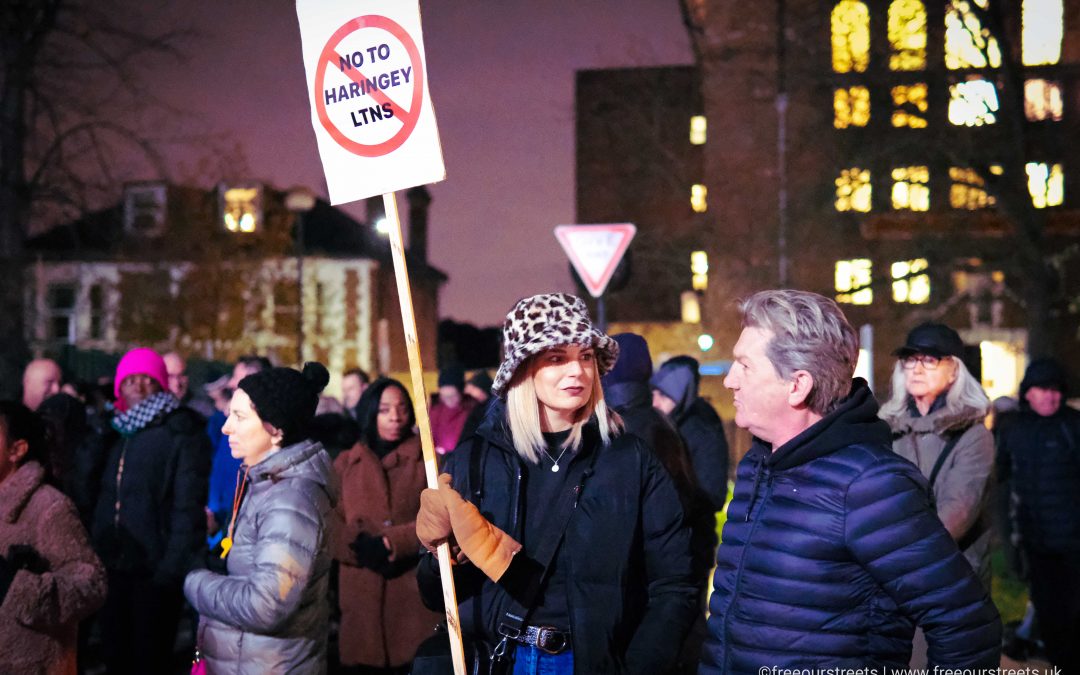The short answer is yes. Councils like Hackney in East London are overriding clear majority verdicts and making permanent a raft of road closures introduced as emergency temporary measures during Lockdown. Hackney alone has imposed 19 LTNs using Lockdown measures, and to date every single consultation has shown majorities of more than 60% of respondents want them removed. So far the council has ignored every result and made each LTN permanent.
In 2021, the Telegraph pointed out that “in the consultations made public so far, 18,314 people have expressed a negative view of the active travel schemes, vastly outnumbering the 7,020 residents who expressed their support.” Since then the pattern has continued – the public says no but councils push on regardless.
Some councils are withholding consultations results altogether, and residents are having to resort to Freedom of Information Requests (FOIs) to obtain information. In the London borough of Brent, for example, resident Sarah Rollinson, forced her council to disclose consultation results for two LTN areas. She found that in Olive Road Area 787 to 198 majority against the road closures. And for the Dollis Hills Area 41 respondents were in favour and 287 were against.
However, online consultations are increasingly designed to avoid altogether questions that show clear majorities or give clear answers. London Cycling Campaign (LCC) which has played a large part in lobbying for, and designing LTNs, advises councils to “avoid questions that elicit yes/no answers”. Instead, they suggest using “sliding scales of approval” and other methods that help to diffuse and deflect public responses. Little wonder that councils like the London Borough of Hackney have paid these cycling campaigners thousands of Pounds in ‘consultancy fees’.
With many LTN consultation results reports, you might be forgiven for wondering if the aim appears to be to deflect and confuse the public with mountains of information. Multipage documents for each individual LTN, present responses to a myriad of micro-questions. ‘Do you spend more time in the area?’ ‘Is it easier to cross the street?’, ‘Does the street look nice?’ ‘How many people run or jog?’, ‘Is there more space for cycling?’, ‘Are car trips inconvenienced?’ And so on.
This wealth of information is then usefully broken down by religion, ethnicity, gender – ‘2% of respondents describe themselves as ‘non-binary’ – reports one of Islington Council’s Amwell People Friendly Streets report – sexual orientation, age, cyclist, single car-owner, multiple car-owner, car passenger and so on. Information is broken down again and again until it’s nearly impossible to make sense of. No wonder Islington’s Amwell report-back comes with some 17 accompanying documents.
Of course, informations can be a good thing, and we might want to know what kind of people are responding. But with so many of these consultation exercises, they are designed deliberately so as to find it almost impossible to find clear yes or no as to whether residents want LTN barriers to be retained or removed from their streets.
And so, instead of consultations being a process whereby the public gets to decide on projects and proposals, they become one great big ‘conversation’. “We host open digital conversations that are easy to participate in and representative of the whole community.” Says Commonplace, the pro-LTN organisation behind many of today’s online consultancy programmes. The impression given in these reports is that the public is a diffuse mass of people, all talking at cross-purposes with one another. Everyone has an opinion. All of them, and consequently, none of them are valid. And so the councils, officers and their experts get to decide everything on our behalf.
Another interesting shift is that councils are moving away from using professional market research companies to conduct quality, in-depth consultations, in favour of activist-organisations such as Steer, Commonplace, Sustrans, and Systra who publicly advocate and campaign around issues like cycling, ’active travel’, Green issue and ‘sustainable cities’.
In 2016 Hackney Council engaged market research company BDRC to design and manage a consultation on proposals to close or restrict car access to the London Fields area of the borough. Residents and business owners were presented with a set of clear proposals and alternatives.
After more than a year of real-world community consultations, a clear majority overwhelmingly rejected LTN-style road closures. However, many did opt for less drastic proposals some of the traffic issues of the area. It was a good piece of research carried out over a period of more than a year.
As a result of the consultation, Hackney Council dropped plans to close off roads in the area. That was until Lockdown measures allowed them to disregard the views of residents and close their roads anyway.
Government ‘guidance’ under Lockdown severely restricted the public’s democratic say in local and national affairs. Councils were now allowed to implement a project without any prior consultation or notification, and the public were then allowed to express an opinion on what had already been done to them. This meant that councils like London Borough of Hackney could revive projects already rejected by residents, such as the London Fields closures, and simply impose them.
It is debatable as to whether pre-Lockdown style consultations were really a satisfactory way of conducting local democracy and taking major decisions. Today’s post-Lockdown ‘digital conversations’ masquerading as democratic participation are really a wake-up call. Our democratic voice is being seriously eroded and it is time for citizens to return to the real public square and take back our democracy.

